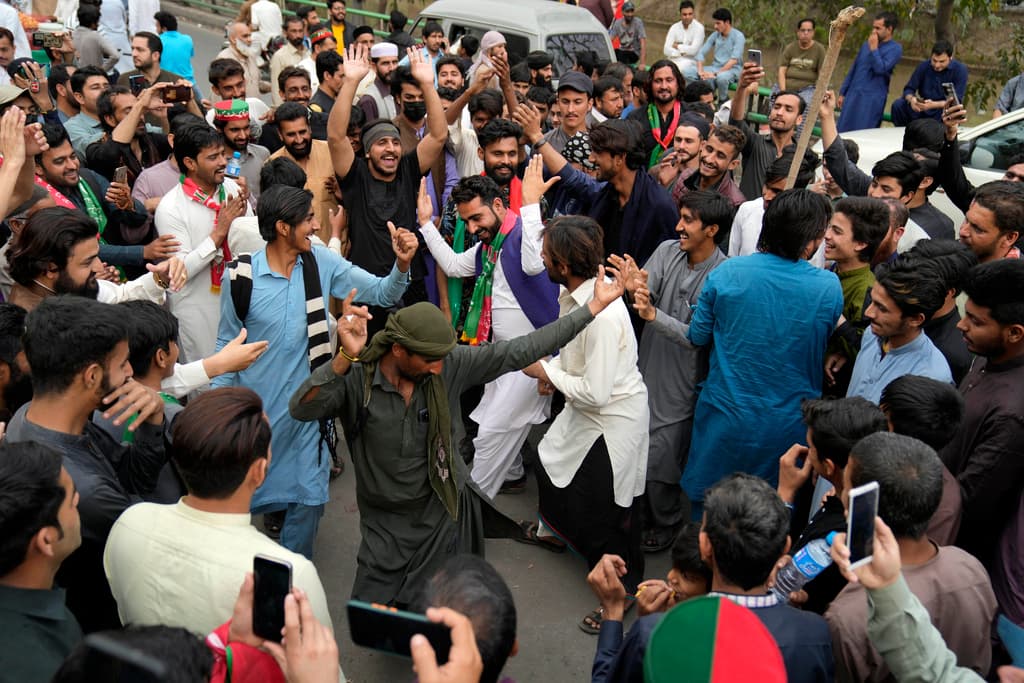Pakistan Teeters as Ex-Premier Plots Return
The formerly America-allied country faces a host of crises as it falls under Beijing’s spell.

Facing a host of crises, nuclear-armed Pakistan is torn between a military-backed government and a popular and rebellious former prime minister, Imran Khan, as the formerly America-allied country falls under Beijing’s spell.
The Islamabad parliament, which is controlled by the government, on Wednesday was weighing a motion to outlaw Mr. Khan’s party, Pakistan Tahreek-e-Insaf. The motion, if passed, would formally block Mr. Khan’s return to power in the next national election, likely in October.
The parliamentary showdown follows numerous lawsuits, arrest threats, and long harassment of Mr. Khan and his supporters by the government of Prime Minister Sharif. Since being ousted from the premiership by a parliamentary no-confidence vote last April, Mr. Khan has seen his popularity grow.
Now 70, the former cricket star has accused America, the Pakistani army, and his political opponents of conspiring against him, and at one point was injured while leading a protest rally.
“I am becoming increasingly concerned about Pakistan,” a former American ambassador to Afghanistan, Zalmay Khalilzad, tweeted Tuesday. “The government appears to have decided to set up Imran Khan as Enemy No 1 of the State. Such steps will only deepen Pakistan’s triple crises: political, economic, and security. Already, some countries have suspended planned investments.”
Mr. Khalilzad, an Afghan-born American diplomat who has served as ambassador to the United Nations and more recently oversaw negotiations under President Trump to end America’s presence in Afghanistan, is far from popular at Islamabad.
“Pakistan does not need lectures or unsolicited advice from anyone on how to cope with the challenges we face today,” the Pakistani foreign ministry said in a statement last week. “As a resilient nation, we will come out stronger from the present difficult situation.”
“Difficult” may be a strong understatement. The country is reeling after last October’s flooding that killed more than 1,700 people. An earthquake Wednesday may add to the misery. According to government statistics, 52,398 people left the country in the first two months of this year alone.
Pakistan is about to default on $80 billion worth of international loans. Saudi Arabia just announced it would no longer provide Islamabad with interest-free loans. The International Monetary Fund says Pakistan is progressing, but is yet to make all the steps necessary to secure a $6.5 billion loan to avoid a default.
“The IMF support remains doubtful,” Mr. Khalilzad wrote. “If the steps mentioned take place, international support for #Pakistan will decline further. Political polarization and violence will likely increase.”
Like a lot of politicians’ fall from grace in Pakistan, Mr. Khan’s ouster last year resulted from a dispute with the country’s most powerful force: the military. It is widely seen as the reason Mr. Khan was dumped last year in favor of Mr. Sharif.
Yet, this time things may not go according to script. As Pakistan’s problems amass, “the mystique of the military has faded,” a New Delhi-based vice chairman at Manipal Advanced Research Group, Madhav Das Nalapat, tells the Sun. “There are signs that the army is no longer the force it was, and the survival of Khan depends on that” being true.
Mr. Khan initially gained the military’s backing on the belief that he would be able to secure support from Western countries — even as the Pakistani military tightened relations with Communist China. Yet, Mr. Khan “failed to hook the West,” Mr. Nalapat said in a phone interview from Delhi.
Yet, since his ouster, Mr. Khan has been plotting his return to power, leading huge rallies and taking advantage of the government’s unpopularity and the disillusion with the generals’ ultimate control over politics.
“Khan is the first Pakistani politician to scold the military,” Mr. Nalapat says, adding that the “military is controlled by one province, Punjab.” As the rest of the country feels increasingly resentful of the government’s incompetence, and while Imran Khan remains hugely popular, the army has threatened to arrest him on more than 80 cases pending in Pakistani courts.
Yet, rather than actually arresting him, the military’s real goal is to chase Mr. Khan out of the country, ending his political challenge, Mr. Nalapat asserts.
Meanwhile, he says, the Indian government has let Beijing know that it would see Communist China as the responsible party for any failure in securing the Pakistani nuclear arsenal: “The nukes are controlled by the military, and the military is controlled by China.”
Washington is concerned about Pakistan’s Beijing ties. We are “talking to them about some of the perils we see in the closer relations with the People’s Republic of China and the opportunities we think that come from closer relations with us and other like-minded countries — and frankly, they see that,” a top state department official, Derek Chollet, said while visiting Islamabad last month.
Yet, nuclear-armed Pakistan is as close as possible to being a failed state — and that makes it perfect prey for Beijing.

